Fleurs du Mal Magazine


Or see the index
Christian Kunda Mutoki porte un nouveau regard sur Le Horla de Guy de Maupassant.
 Il est précédé d’une préface et suivi d’une postface.
Il est précédé d’une préface et suivi d’une postface.
Il vient rafraîchir les problématiques qui touchent à la morale, à l’athéisme, à des amours tumultueuses et infidèles. . .
Le monde d’aujourd’hui diffère-t-il de celui décrit au XIXe siècle par l’écrivain français ? La science a-t-elle amélioré la condition existentielle de l’homme ?
Voici quelques questions majeures qui trouvent ici un regard neuf.
Christian Kunda Mutoki a préparé sa thèse de doctorat à l’Université Paul Verlaine, actuelle Université de la Lorraine (Metz, France). Il est écrivain et professeur de Littérature et civilisation françaises à l’Université de Lubumbashi, en RDC.
GUY DE MAUPASSANT
Une certaine idée de l’homme dans Le Horla
Christian Kunda Mutoki
Cahiers des sciences du langage
Langue Linguistique Littérature
Broché
Format : 15,5 x 24 cm
ISBN : 978-2-8066-3665-2
14 décembre 2018
70 pages
€ 11,5
# New books
Une certaine idée de l’homme dans Le Horla
de Guy de Maupassant
Christian Kunda Mutoki
• fleursdumal.nl magazine
More in: - Book News, - Bookstores, Archive M-N, Archive M-N, Art & Literature News, Guy de Maupassant, Maupassant, Guy de, Maupassant, Guy de
THE RACE QUESTION
Scene—Race track. Enter old coloured man, seating himself.
“Oomph, oomph. De work of de devil sho’ do p’ospah. How ‘do, suh? Des tol’able, thankee, suh. How you come on? Oh, I was des a-sayin’ how de wo’k of de ol’ boy do p’ospah. Doesn’t I frequent the racetrack? No, suh; no, suh. I’s Baptis’ myse’f, an’ I ‘low hit’s all devil’s doin’s. Wouldn’t ‘a’ be’n hyeah to-day, but I got a boy named Jim dat’s long gone in sin an’ he gwine ride one dem hosses. Oomph, dat boy! I sut’ny has talked to him and labohed wid him night an’ day, but it was allers in vain, an’ I’s feahed dat de day of his reckonin’ is at han’.
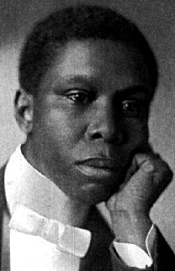 “Ain’t I nevah been intrusted in racin’? Humph, you don’t s’pose I been dead all my life, does you? What you laffin’ at? Oh, scuse me, scuse me, you unnerstan’ what I means. You don’ give a ol’ man time to splain hisse’f. What I means is dat dey has been days when I walked in de counsels of de on-gawdly and set in de seats of sinnahs; and long erbout dem times I did tek most ovahly strong to racin’.
“Ain’t I nevah been intrusted in racin’? Humph, you don’t s’pose I been dead all my life, does you? What you laffin’ at? Oh, scuse me, scuse me, you unnerstan’ what I means. You don’ give a ol’ man time to splain hisse’f. What I means is dat dey has been days when I walked in de counsels of de on-gawdly and set in de seats of sinnahs; and long erbout dem times I did tek most ovahly strong to racin’.
“How long dat been? Oh, dat’s way long back, ‘fo’ I got religion, mo’n thuty years ago, dough I got to own I has fell from grace several times sense.
“Yes, suh, I ust to ride. Ki-yi! I nevah furgit de day dat my ol’ Mas’ Jack put me on ‘June Boy,’ his black geldin’, an’ say to me, ‘Si,’ says he, ‘if you don’ ride de tail offen Cunnel Scott’s mare, “No Quit,” I’s gwine to larrup you twell you cain’t set in de saddle no mo’.’ Hyah, hyah. My ol’ Mas’ was a mighty han’ fu’ a joke. I knowed he wan’t gwine to do nuffin’ to me.
“Did I win? Why, whut you spec’ I’s doin’ hyeah ef I hadn’ winned? W’y, ef I’d ‘a’ let dat Scott maih beat my ‘June Boy’ I’d ‘a’ drowned myse’f in Bull Skin Crick.
“Yes, suh, I winned; w’y, at de finish I come down dat track lak hit was de Jedgment Day an’ I was de las’ one up! Ef I didn’t race dat maih’s tail clean off, I ‘low I made hit do a lot o’ switchin’. An’ aftah dat my wife Mandy she ma’ed me. Hyah, hyah, I ain’t bin much on hol’in’ de reins sence.
“Sh! dey comin’ in to wa’m up. Dat Jim, dat Jim, dat my boy; you nasty putrid little rascal. Des a hundred an’ eight, suh, des a hundred an’ eight. Yas, suh, dat’s my Jim; I don’t know whaih he gits his dev’ment at.
“What’s de mattah wid dat boy? Whyn’t he hunch hisse’f up on dat saddle right? Jim, Jim, whyn’t you limber up, boy; hunch yo’se’f up on dat hoss lak you belonged to him and knowed you was dah. What I done showed you? De black raskil, goin’ out dah tryin’ to disgrace his own daddy. Hyeah he come back. Dat’s bettah, you scoun’ril.
“Dat’s a right smaht-lookin’ hoss he’s a-ridin’, but I ain’t a-trustin’ dat bay wid de white feet—dat is, not altogethah. She’s a favourwright too; but dey’s sumpin’ else in dis worl’ sides playin’ favourwrights. Jim bettah had win dis race. His hoss ain’t a five to one shot, but I spec’s to go way fum hyeah wid money ernuff to mek a donation on de pa’sonage.
“Does I bet? Well, I don’ des call hit bettin’; but I resks a little w’en I t’inks I kin he’p de cause. ‘Tain’t gamblin’, o’ co’se; I wouldn’t gamble fu nothin’, dough my ol’ Mastah did ust to say dat a honest gamblah was ez good ez a hones’ preachah an’ mos’ nigh ez skace.
“Look out dah, man, dey’s off, dat nasty bay maih wid de white feet leadin’ right fu’m ‘de pos’. I knowed it! I knowed it! I had my eye on huh all de time. Oh, Jim, Jim, why didn’t you git in bettah, way back dah fouf? Dah go de gong! I knowed dat wasn’t no staht. Troop back dah, you raskils, hyah, hyah.
“I wush dat boy wouldn’t do so much jummying erroun’ wid dat hoss. Fust t’ing he know he ain’t gwine to know whaih he’s at.
“Dah, dah dey go ag’in. Hit’s a sho’ t’ing dis time. Bettah, Jim, bettah. Dey didn’t leave you dis time. Hug dat bay mare, hug her close, boy. Don’t press dat hoss yit. He holdin’ back a lot o’ t’ings.
“He’s gainin’! doggone my cats, he’s gainin’! an’ dat hoss o’ his’n gwine des ez stiddy ez a rockin’-chair. Jim allus was a good boy.
“Confound these spec’s, I cain’t see ’em skacely; huh, you say dey’s neck an’ neck; now I see ’em! now I see ’em! and Jimmy’s a-ridin’ like——Huh, huh, I laik to said sumpin’.
“De bay maih’s done huh bes’, she’s done huh bes’! Dey’s turned into the stretch an’ still see-sawin’. Let him out, Jimmy, let him out! Dat boy done th’owed de reins away. Come on, Jimmy, come on! He’s leadin’ by a nose. Come on, I tell you, you black rapscallion, come on! Give ’em hell, Jimmy! give ’em hell! Under de wire an’ a len’th ahead. Doggone my cats! wake me up w’en dat othah hoss comes in.
“No, suh, I ain’t gwine stay no longah, I don’t app’ove o’ racin’, I’s gwine ‘roun’ an’ see dis hyeah bookmakah an’ den I’s gwine dreckly home, suh, dreckly home. I’s Baptis’ myse’f, an’ I don’t app’ove o’ no sich doin’s!”
Paul Laurence Dunbar
(1872 – 1906)
The Race Question
From The Heart Of Happy Hollow, a collection of short stories reprinted in 1904 by Dodd, Mead and Company, New York.
Short story
• fleursdumal.nl magazine
More in: *Archive African American Literature, Archive C-D, Archive C-D, Dunbar, Paul Laurence, Dunbar, Paul Laurence, Paul Laurence Dunbar, Paul Laurence Dunbar
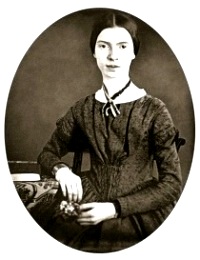
Wild nights – Wild nights!
Wild nights – Wild nights!
Were I with thee
Wild nights should be
Our luxury!
Futile – the winds –
To a Heart in port –
Done with the Compass –
Done with the Chart!
Rowing in Eden –
Ah – the Sea!
Might I but moor – tonight –
In thee!
Emily Dickinson
(1830-1886)
Wild nights – Wild nights!
• fleursdumal.nl magazine
More in: Archive C-D, Archive C-D, Dickinson, Emily
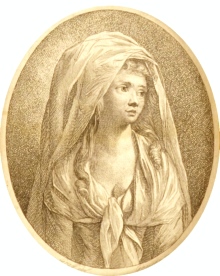
Sehnsucht
Entfernter Freund!
Um den auf immer
Im stillen Zimmer
Mein Auge weint;
Dann, wenn die Sterne
Am Himmel blinken,
Und Liebe winken,
Denk ich der Ferne
In der du, ach!
Jetzt um mich leidest,
Und Freuden meidest,
Mit Thränen nach.
Und wenn mein Freund
Im Stralenkleide,
Zu meinem Leide
Mitleidig scheint;
Da werf ich mich,
Mit stummen Sehnen
Und tausend Thränen –
O! sähst du mich!
An jene Flüsse
Zur Erde nieder,
Die unsre Lieder
Und unsere Küsse
Beym Sternenschein
So oft belauschten,
und sanfter rauschten
Durch diesen Hayn –
Ach! keine Lieder
Und keine Küsse,
Ihr – Hayn – und Flüsse!
Belauscht ihr wieder –
Und denk an dich,
An jene Zeiten,
So voller Freuden
Für mich und dich;
Dann ruf ich dich
Durch alle Wälder,
Durch Thal und Felder
Als hört’st du mich.
Und wüst und schaurig
Ist Hayn – und Trifte,
Wie Todtengrüfte,
So bang und traurig.
O! Mond und Sterne,
Blickt tausend Küsse
Und tausend Grüsse
Dem in der Ferne,
Ihr könnt’ ihn finden!
So ruf und weine
Ich oft alleine
In öden Gründen.
So lächelt dir
Der Mond oft Küsse
So traurig süsse
Mein Freund von mir.
Sophie Albrecht
(1757-1840)
Gedicht
Im Junius 1783
• fleursdumal.nl magazine
More in: Archive A-B, Archive A-B, CLASSIC POETRY, Galerie Deutschland

The Outlet
My river runs to thee:
Blue sea, wilt welcome me?
My river waits reply.
Oh sea, look graciously!
I’ll fetch thee brooks
From spotted nooks,—
Say, sea,
Take me!
Emily Dickinson
(1830-1886)
The Outlet, 1860
• fleursdumal.nl magazine
More in: Archive C-D, Dickinson, Emily

Les heures de la nuit – Poéme
Nous sommes des Heures heureuses
Par qui le Plaisir est conduit;
Quand les étoiles amoureuses
Percent le voile de la nuit,
Près de la beauté qui repose,
Œil entr’ouvert, bouche mi-close,
Vers un lit parfumé de rose,
Nous guidons César et l’Amour.
Et, là, nous demeurons sans trêve
Jusqu’au moment où, comme un rêve,
L’Aube naissante nous enlève
Sur le premier rayon du jour.
Gérard de Nerval
(1808 – 1855)
Les heures de la nuit – Poéme
• fleursdumal.nl magazine
More in: Archive M-N, Nerval, Gérard de, Nerval, Gérard de
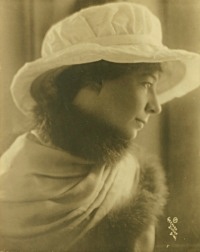
The Look
Strephon kissed me in the spring,
Robin in the fall,
But Colin only looked at me
And never kissed at all.
Strephon’s kiss was lost in jest,
Robin’s lost in play,
But the kiss in Colin’s eyes
Haunts me night and day.
Sara Teasdale
(1884-1933)
The Look
• fleursdumal.nl magazine
More in: Archive S-T, Archive S-T, Teasdale, Sara
“And I? May I say nothing, my lord?” With these words, Oscar Wilde’s courtroom trials came to a close. The lord in question, High Court justice Sir Alfred Wills, sent Wilde to the cells, sentenced to two years in prison with hard labor for the crime of “gross indecency” with other men.
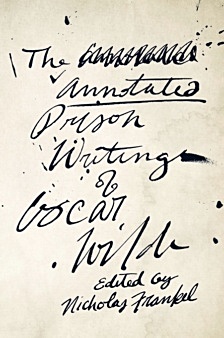 As cries of “shame” emanated from the gallery, the convicted aesthete was roundly silenced.
As cries of “shame” emanated from the gallery, the convicted aesthete was roundly silenced.
But he did not remain so. Behind bars and in the period immediately after his release, Wilde wrote two of his most powerful works—the long autobiographical letter De Profundis and an expansive best-selling poem, The Ballad of Reading Gaol.
In The Annotated Prison Writings of Oscar Wilde, Nicholas Frankel collects these and other prison writings, accompanied by historical illustrations and his rich facing-page annotations. As Frankel shows, Wilde experienced prison conditions designed to break even the toughest spirit, and yet his writings from this period display an imaginative and verbal brilliance left largely intact.
Wilde also remained politically steadfast, determined that his writings should inspire improvements to Victorian England’s grotesque regimes of punishment. But while his reformist impulse spoke to his moment, Wilde also wrote for eternity.
At once a savage indictment of the society that jailed him and a moving testimony to private sufferings, Wilde’s prison writings—illuminated by Frankel’s extensive notes—reveal a very different man from the famous dandy and aesthete who shocked and amused the English-speaking world.
Nicholas Frankel is Professor of English at Virginia Commonwealth University.
“Frankel provides a valuable service in comprehensively editing these works for a fresh generation of readers.” — Joseph Bristow, University of California, Los Angeles
The Annotated Prison Writings of Oscar Wilde
Oscar Wilde
Edited by Nicholas Frankel
Harvard University Press
Paperback
408 pages
Publication: May 2018
ISBN 9780674984387
€17.00
# more books
The Annotated Prison Writings of Oscar Wilde
-Clemency Petition to the Home Secretary, 2 July 1896
-De Profundis
-Letter to the Daily Chronicle, 27 May 1897
-The Ballad of Reading Gaol
-Letter to the Daily Chronicle, 23 March 1898
• fleursdumal.nl magazine
More in: - Book News, - Book Stories, Archive W-X, Archive W-X, Art & Literature News, CRIME & PUNISHMENT, REPRESSION OF WRITERS, JOURNALISTS & ARTISTS, Wilde, Oscar, Wilde, Oscar
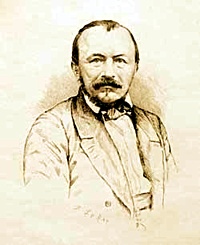
Pensée de Byron – Élégie
Par mon amour et ma constance,
J’avais cru fléchir ta rigueur,
Et le souffle de l’espérance
Avait pénétré dans mon coeur ;
Mais le temps, qu’en vain je prolonge,
M’a découvert la vérité,
L’espérance a fui comme un songe…
Et mon amour seul m’est resté!
Il est resté comme un abîme
Entre ma vie et le bonheur,
Comme un mal dont je suis victime,
Comme un poids jeté sur mon coeur!
Pour fuir le piège où je succombe,
Mes efforts seraient superflus;
Car l’homme a le pied dans la tombe,
Quand l’espoir ne le soutient plus.
J’aimais à réveiller la lyre,
Et souvent, plein de doux transports,
J’osais, ému par le délire,
En tirer de tendres accords.
Que de fois, en versant des larmes,
J’ai chanté tes divins attraits !
Mes accents étaient pleins de charmes,
Car c’est toi qui les inspirais.
Ce temps n’est plus, et le délire
Ne vient plus animer ma voix;
Je ne trouve point à ma lyre
Les sons qu’elle avait autrefois.
Dans le chagrin qui me dévore,
Je vois mes beaux jours s’envoler;
Si mon oeil étincelle encore,
C’est qu’une larme va couler!
Brisons la coupe de la vie;
Sa liqueur n’est que du poison;
Elle plaisait à ma folie,
Mais elle enivrait ma raison.
Trop longtemps épris d’un vain songe,
Gloire ! amour ! vous eûtes mon coeur:
O Gloire ! tu n’es qu’un mensonge;
Amour! tu n’es point le bonheur!
Gérard de Nerval
(1808 – 1855)
Pensée de Byron – Élégie
fleursdumal.nl magazine
More in: Archive M-N, Byron, Lord, Nerval, Gérard de
In Her Own Words: The Life and Poetry of Aelia Eudocia is the first full-length study to examine Eudocia’s writings as a unified whole and to situate them within their wider fifth-century literary, social, and religious contexts.
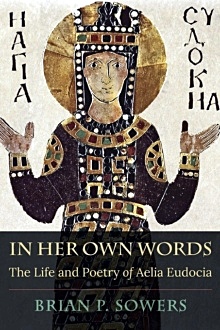 Responsible for over 3,000 lines of extant poetry, Eudocia is one of the best-preserved ancient female poets. Because she wrote in a literary mode frequently suppressed by proto-orthodox (male) leaders, much of her poetry does not survive, and what does survive remains understudied and underappreciated.
Responsible for over 3,000 lines of extant poetry, Eudocia is one of the best-preserved ancient female poets. Because she wrote in a literary mode frequently suppressed by proto-orthodox (male) leaders, much of her poetry does not survive, and what does survive remains understudied and underappreciated.
This book represents a detailed investigation into Eudocia’s works: her epigraphic poem in honor of the therapeutic bath at Hammat Gader, her Homeric cento—a poetic paraphrase of the Bible using lines from Homer—and her epic on the fictional magician-turned-Christian, Cyprian of Antioch.
Reading her poetry as a whole and in context, Eudocia emerges as an exceptional author representing three unique late-antique communities: poets interested in preserving and transforming classical literature; Christians whose religious views positioned them outside and against traditional power structures; and women who challenged social, religious, and literary boundaries.
Brian P. Sowers is Assistant Professor of Classics at Brooklyn College, City University of New York.
In Her Own Words
The Life and Poetry of Aelia Eudocia
Brian P. Sowers
Hellenic Studies Series 80
Harvard University Press
Paperback
ISBN 9780674987371
275 pages
€22.50
Publication: January 2019
# new books
Aelia Eudocia
Life and work – poetry
fleursdumal.nl magazine
More in: - Book News, Archive E-F, Archive E-F, Archive S-T, Art & Literature News, CLASSIC POETRY
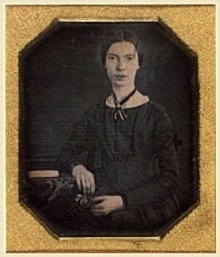
I’m Nobody! Who are you?
I’m Nobody! Who are you?
Are you – Nobody – too?
Then there’s a pair of us!
Don’t tell! they’d advertise – you know!
How dreary – to be – Somebody!
How public – like a Frog –
To tell one’s name – the livelong June –
To an admiring Bog!
Emily Dickinson
(1830-1886)
I’m Nobody! Who are you?
fleursdumal.nl magazine
More in: Archive C-D, Archive C-D, Dickinson, Emily
An indispensable anthology of brilliant hard-to-find writings by Poe on poetry, the imagination, humor, and the sublime which adds a new dimension to his stature as a speculative thinker and philosopher. Essays (in translation) by Charles Baudelaire, Stéphane Mallarmé, Paul Valéry, & André Breton shed light on Poe’s relevance within European literary tradition.
These are the arcana of Edgar Allan Poe: writings on wit, humor, dreams, drunkenness, genius, madness, and apocalypse. Here is the mind of Poe at its most colorful, its most incisive, and its most exceptional.
 Edgar Allan Poe’s dark, melodic poems and tales of terror and detection are known to readers everywhere, but few are familiar with his cogent literary criticism, or his speculative thinking in science, psychology or philosophy. This book is an attempt to present his lesser known, out of print, or hard to find writings in a single volume, with emphasis on the theoretical and esoteric. The second part, “The Friend View,” includes seminal essays by Poe’s famous admirers in France, clarifying his international literary importance.
Edgar Allan Poe’s dark, melodic poems and tales of terror and detection are known to readers everywhere, but few are familiar with his cogent literary criticism, or his speculative thinking in science, psychology or philosophy. This book is an attempt to present his lesser known, out of print, or hard to find writings in a single volume, with emphasis on the theoretical and esoteric. The second part, “The Friend View,” includes seminal essays by Poe’s famous admirers in France, clarifying his international literary importance.
America has never seen such a personage as Edgar Allan Poe. He is a figure who appears once an epoch, before passing into myth. American critics from Henry James to T. S. Eliot have disparaged and attempted to explain away his influence to no end, save to perpetuate his fame. Even the disdainful Eliot once conceded, “and yet one cannot be sure that one’s own writing has not been influence by Poe.”
Edgar Allan Poe (1809-1849), born in Boston, Massachusetts, was an American poet, writer, editor, and literary critic. He is well known for his haunting poetry and mysterious short stories. Regarded as being a central figure of Romanticism, he is also considered the inventor of detective fiction and the growing science fiction genre. Some of his most famous works include poems such as The Raven, Annabel Lee, and A Dream Within a Dream; tales such as The Cask of Amontillado, The Masque of Red Death, and The Tell-Tale Heart.
Title: The Unknown Poe
Subtitle: An Anthology of Fugitive Writings
Author: Edgar Allan Poe
Edited by Raymond Foye
Publisher: City Lights Publishers
Format: Paperback
124 pages
1980
ISBN-10 0872861104
ISBN-13 9780872861107
List Price $11.95
# American writers
Edgar Allan Poe
fleursdumal.nl magazine
More in: - Book Lovers, - Book Stories, Archive O-P, Archive O-P, Art & Literature News, Edgar Allan Poe, Poe, Edgar Allan, Poe, Edgar Allan, Tales of Mystery & Imagination
Thank you for reading Fleurs du Mal - magazine for art & literature